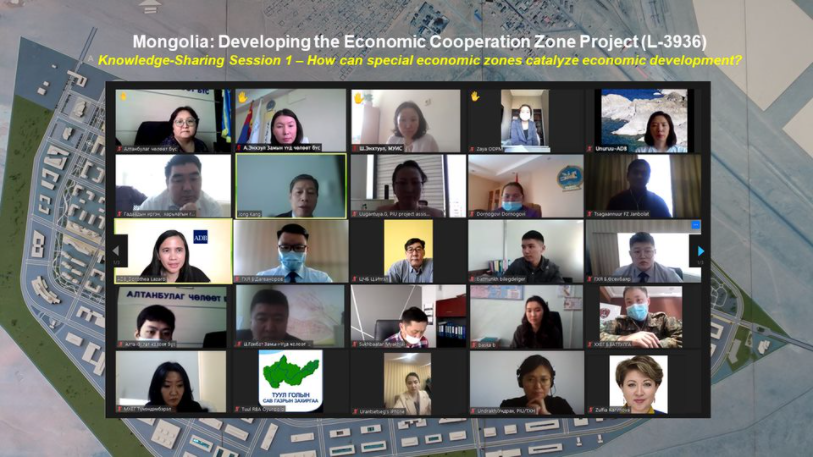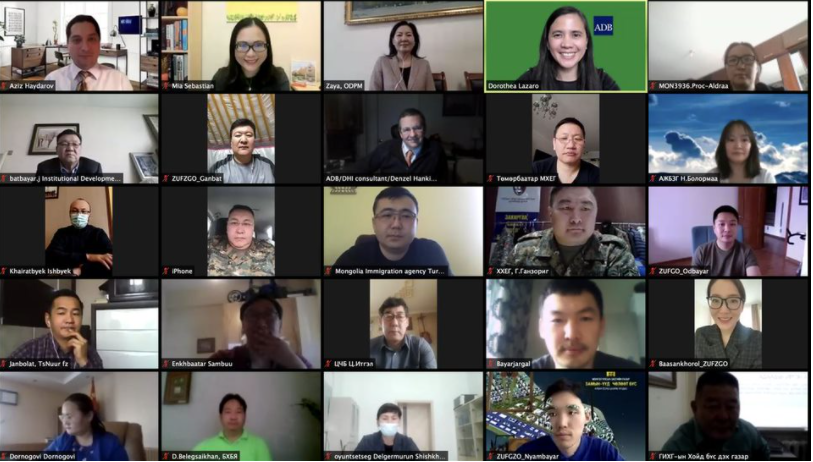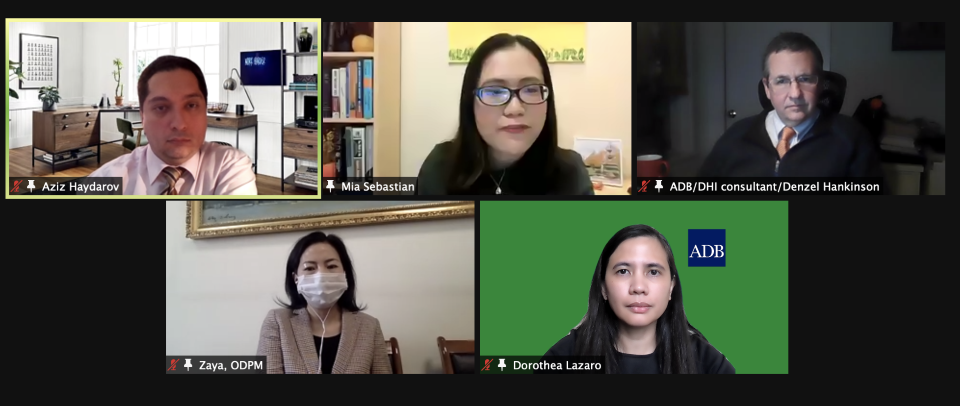Seminar & Lecture Series
Knowledge-Sharing Sessions for Mongolia Developing the Economic Cooperation Zone Project
24 Mar 2021 - 28 Apr 2021 Online


ADB is currently implementing the “Developing the Economic Cooperation Zone Project,” which aims to operationalize Mongolia’s Zamyn-Uud free zone, and serve as a catalyst for diversifying Mongolia’s economy, integrating it into regional and global value chains, and increasing employment opportunities. To complement project activities, Public Mgt, Financial Sector, & Regional Coop Division, East Asia Department (EAPF) EAPF organized a series of knowledge sessions from March to April 2021 with around 300 participants.
Supported by TA 9679, session topics include best practices in special economic zones (SEZs), water-saving technology, and options for public-private partnership in zone operations. ADB staff and international experts shared knowledge and lessons to public and private stakeholders in Mongolia.
Session 1: How can special economic zones (SEZs) catalyze economic development?
24 March 2021
Jong Woo Kang, Principal Economist, Economic Research and Regional Cooperation Department of ADB discussed the rise and evolution of economic zones in Asia-Pacific, modalities and emerging trends. He shared that fiscal and non-fiscal incentives, factor costs, strategic location, institutional capacity, and state commitment are crucial factors for SEZs to be successful, while governance and rent seeking, wrong positioning, and lack of localized strategy contribute to failures in SEZs development. He underscored that the popularity of SEZs still remains strong under rapidly evolving environment (i.e., growth of services, knowledge economy, supply chain), but approach should be tailored to country’s economic and developmental context. ![]()
Session 2: International Best Practices and Practical Experience in SEZs
31 March 2021
In this session, Prof. Aradhana Aggarwal, from the Department of International Economics and Management, Copenhagen Business School discussed lessons learned from the People’s Republic of China (PRC), India, and select Central Asian countries. She identified the five stages of implementation of SEZ policy: (i) planning, (ii) strategy-building, (iii) policy design, (iv) implementation strategy, and (v) monitoring and evaluation. SEZs may be developed by the public sector, private sector or in public private partnership and there is evidence of their success irrespective of the ownership. Best practices regarding the tax incentives, infrastructure development, one stop shop, labor laws and environment laws were also discussed.![]()
Elmer San Pascual, retired government Career Executive Officer of Philippine Economic Zone Authority, shared the Philippine experience in developing SEZs. He underscored the need to (i) choose a location that is easily accessible by international air and international sea transport, (ii) locate one where people and/or workers can be easily sourced from, hired, and given access to, and (iii) consider access to lifestyle conveniences. In operating SEZs, a good law detailing the importance of cooperation between and among national government agencies must be present and local government regulations and its taxing powers must be considered. Incentives and proper management of incentives also play crucial roles in the success of the business operations of enterprises in the SEZs.![]()
Session 3: Adopting Water-Saving Technology in Zone Operations
14 April 2021
Eduardo Garcia Alonso, water systems expert, shared regional experience in smart water management including from Viet Nam, Nepal, Georgia and the PRC. He proposed the following in developing a smart water system in Zamyn-Uud free zone: (i) monitor and control water usage to check if the agreed water consumptions are met by zone operators; (ii) enable equitable distribution of water resources within the community and within the zone; (iii) reduce water-related wastage; (iv) improve the quality of the water served and reduce risks related with public health; (v) increase the life span of infrastructures; and (vii) enhance the public perception of the Zamyn-Uud Free Zone Project including through efficiency and rational water use. Water reutilization systems must be enhanced by smart water technologies, in order to make them more efficient and useful. Even if the technical systems, including measurement equipment, hardware, software and associated staff are in place, the administrative and regulatory framework are key for success. Economies of scale can be important in water systems therefore cooperating with the neighboring PRC and connecting (at least for emergency situations) with Erenhot water system can be advantageous.![]()
Session 4: Public-Private Partnerships (PPP) Options in Zone Operations
28 April 2021
Denzel Hankinson, PPP Specialist, described the characteristics of public-private partnerships (PPPs), different types, example of major types, and some considerations of PPP models for Mongolia. He showcased SEZ case studies including the Busan New Port in South Korea, Bejaja International Container Terminal in Algeria, Jebal Ali Port Zone in United Arab Emirates, and Khorgos SEZ and Inland Container Depot in Kazakhstan. He also shared the success factor of Aqaba SEZ in Jordan such as government support, risk mitigation, bankability and simplicity. ![]()
Mia Mary Sebastian, Deputy Executive Director of PPP Center of the Philippines, elaborated on Philippine PPP experience with focus on ecozones. The PPP Center facilitates the implementation of the country’s PPP Program and serves as a central coordinating and monitoring agency for all PPP projects in the country. She mentioned the need to consider: (i) legal framework to carry out a PPP arrangement, (ii) regulated participation of foreign nationals, (iii) analysis of property arrangements in forming an ecozone, (iv) review of government’s position from a tax perspective, and (v) contractual arrangements with locators on project objectives and delivery options.![]()
Program
- James Lynch, Director General, East Asia Department, ADB
- Zunyou Wu, Chief Epidemiologist of the Center for Disease Control and Prevention in China (China CDC);
 and
and - Rongmeng Jiang, Director of Office of National Infectious Disease Medical Quality Control Center, Director of Infectious Disease Diagnosis and Treatment Center of Beijing Ditan Hospital Affiliated to Capital Medical University, Member of Experts Committee of National Health Commission.
 (Stayed in Wuhan for 109 days to guide and support local efforts in combating COVID-19).
(Stayed in Wuhan for 109 days to guide and support local efforts in combating COVID-19).
- Yolanda Fernandez Lommen, Country Director, PRC Resident Mission, ADB
- Sen Gong, Executive Vice-President, CIKD

- Yang Yao, Professor and Dean of National School of Development, Executive Director of Institute of South South Cooperation and Development, Peking University.
- Wei Xu, Deputy Director General, Macroeconomic Research Department, the Development Research Center of the State Council (DRC).

- James Lynch, Director General, East Asia Department, ADB
Highlights
Speakers Profiles
Dr. Sen Gong is Executive Vice-President (Director-General) of the Center for International Knowledge on Development (CIKD), Secretary-General of Sustainable Development Forum (SDF), and Senior Research Fellow of the Development Research Center of the State Council (DRC).
Over the past three years, he has led the operation of the newly-established CIKD, building a broad network with multilateral and bilateral agencies (such as the World Bank, UNDESA, UNESCO, UNIDO, UNICEF, IDB, ADB, EBRD,OECD, DFID, etc), internationally-renowned think tanks (IDS, DIE, Oxford University etc.) and key Chinese ministries (Ministry of Foreign Affairs, Ministry of Finance, Ministry of Commerce etc.), conducting researches such as China’s poverty reduction, and China’s progress reports on implementing the SDGs, and hosting the Sustainable Development Forum as a global platform to exchange sustainable development theories and practices.
Before joining CIKD in 2017, Dr. Gong has worked in DRC since 2002 as Director-General of the Research Institute of Public Administration and Human Resources and Deputy Director-General of the Research Department of Social Development. Prior to these, Dr. GONG worked at the Ministry of Civil Affairs and at the Ministry of Human Resources and Social Security.
Dr. Gong was appointed by UN Secretary General Mr. Antonio Guterres in 2018 as one of the 24 members of the UNDESA Committee of Development Policy, the only representative from China. He also serves at both the Expert Advisory Board of the Ministry of Human and Social Security and the Expert Advisory Board of the Ministry of Civil Affairs of China.
Dr. Gong’s research interests include social security, health care, employment, social governance, public administration as well as development studies and sustainable development. Dr. Gong has written intensively on policy issues and co-authored 5 books.
Dr. Gong got his bachelor’s degree in geography at Beijing Normal University in China. He obtained his master’s degree in social research from the University of Bath and PhD degree in Social Policy from the University of Sheffield in UK.
Dr. Rongmeng Jiang, MD is Chief Physician, Beijing Ditan Hospital (Beijing Special Hospital for Infectious Diseases, affiliated to Capital Medical University); Member of the National Advisory Committee on Infectious Diseases, National Health Commission (Former Ministry of Health); Member of National Expert Group of Covid-19, National Health Commission (Former Ministry of Health)
After graduation from the Health Science Center of Peking University (Former Beijing Medical University) in 1995, Dr. Jiang has been engaged in the clinical diagnosis and treatment, teaching, training and research of infectious diseases.
As a clinical expert, Dr. Jiang has provided on-site guidance on medical treatment of major and sudden infectious diseases such as new coronavirus pneumonia, avian influenza, pneumonic plague, Ebola and SARS in China, Sierra Leone, Madagascar and many other places. Dr. Jiang has participated in the development of National Diagnostic Standards and Prevention Programs of the National Health Commission, such as Covid-19, Plague, Influenza, Middle East Respiratory Syndrome (MERS), and Ebola virus disease (Ebola), etc.
As a member of the national expert group, he went to Wuhan city on the early stage to guide and participate in the clinical treatment of COVID-19 for over 3 months. He was assigned to visit different hospitals in Wuhan city to carry out investigations of fever clinics, assist in the diagnosis and treatment of the cases including the severe patients, and guide the reconstruction of the isolation wards. He took part in the establishment and implementation of Antibody Testing Programs in Wuhan city, and carried out investigation and management for the asymptomatic infections, “Return to positive” and “Long-term positive” cases. He also trained hundreds of medical professionals from Wuhan and other provinces all over China.
Xiheng Jiang is an associate fellow of Development Research Center of the State Council (DRC) and Vice President of China Center for International Knowledge on Development (CIKD). She joined the Department of International Cooperation of DRC in 2000. From March 2008 to April 2015, she worked as the Director of Research and Programs Division of the Department. From April 2015 till April 2017, she served as the Deputy Director General of the Department. Since April 2017, she has been working as Vice President of CIKD.
Ms. Jiang obtained her bachelor and master’s degrees in English from School of Foreign Languages and Literatures, Lanzhou University. She also received a MPA from Graduate School, Chinese Academy of Social Sciences. In addition, she has participated in many training programs of the Central Government and international organizations, such as the management training program of UNDP, and the country strategies program of World Bank.
Her research focuses on international development and the Belt and Road Initiative. She has been in charge of a number of key research projects, such as “China’s Policy Coherence in International Development Cooperation”, “Research on the Belt and Road Initiative”, “Issues of China-OECD Cooperation in a new era”, “Research on China’s Emergency Industry”, “Research on China’s Emergency Management System”, etc. Several of her reports and policy briefs have been read and adopted by the State Council, such as “Policy Advice on Strengthening China-OECD Cooperation”, “Lessons and Implications from Socialization of Emergency Management in Developed Countries”.
Song Liu is the Vice President of Alibaba Group who is mainly in charge of tasks such as strategic planning, public policy, ecological construction of cooperation among industry, universities and research institutions, and technology talents cultivation plan in the technology sector of Alibaba Group. In the past two decades, Mr. Liu has been active in China’s fields of science, technology, industry and think tank, and has deeply observed the trends of internet and information industries. Therefore, he has leading, profound and compound practical experiences in digital transformation of government and enterprises, industrial internet and intelligent manufacturing, innovation and entrepreneurship. Mr. Liu also takes up other social positions such as Vice President of Artificial Intelligence Industry Alliance (ALIA) and Vice President of Alliance of Industrial Internet (All).
Dr. Zunyou Wu is now the Chief Epidemiologist of Chinese Center for Disease Control and Prevention (China CDC). He has been involved in HIV/AIDS research and public health programs for over 30 years. He is now a member of The Joint United Nations Programme on HIV/AIDS (UNAIDS) Scientific Expert Panel, and UNAIDS Evaluation Expert Advisory Committee. Dr. Wu has worked on SARS in 2003 and was an expert in China’s delegation attending 56th World Health Assembly leading by Vice Premier Wu Yi. Dr. Wu joined efforts in controlling COVID-19 since January 2020. He is a member of WHO-China join mission in February 16-24, 2020.
Dr. Yang Yao is a professor at the China Center for Economic Research (CCER) and the National School of Development (NSD), Peking University. He currently serves as the director of CCER and the dean of NSD.
He is a member of the China Finance 40 Forum. His research interests include economic transition and development in China. He has published more than hundred research papers in international and domestic journals as well as several books on institutional economics and economic development in China. He is also a prolific writer for magazines and newspapers, including the Financial Times and the Project Syndicate.
Dr. Yao was awarded the 2008 and 2014 Sun Yefang Award in Economic Science, the 2008 and 2010 Pu Shan Award in International Economics and the 2008 Zhang Peigang Award in Development Economics, and was named the Best Teacher by the Peking University Student Union in 2006.
Dr. Yao obtained a BS in geography in 1986 and an MS in economics in 1989, both from Peking University, and his PhD in development economics from the department of agricultural and applied economics at the University of Wisconsin–Madison in 1996.


